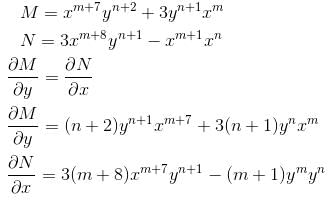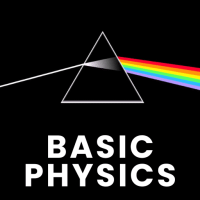Physics Exam > Physics Questions > If the integrating factor of the differential...
Start Learning for Free
If the integrating factor of the differential equation (x7y2 + 3y)dx + (3x8t - x)dy = 0 is of the form xmyn then sum of values of m and n is :
Correct answer is '-6'. Can you explain this answer?
Verified Answer
If the integrating factor of the differential equation(x7y2 + 3y)dx + ...
Let the I.F be xmyn.
Multiplying Differential Equation by I.F it becomes exact
⇒ 



This Differential Equation is Exact.

It is exact
⇒ 

3m - n = - 22
m + 3n = - 4

m + n = –7 + 1 = –6
The correct answer is: -6


3m - n = - 22
m + 3n = - 4

m + n = –7 + 1 = –6
The correct answer is: -6
Most Upvoted Answer
If the integrating factor of the differential equation(x7y2 + 3y)dx + ...
Given Differential Equation:
(x^7y^2 - 3y)dx + (3x^8t - x)dy = 0
Integrating Factor:
To solve this differential equation, we need to find the integrating factor. The integrating factor is given by the formula:
IF = e^(∫P(x)dx)
Step 1: Convert the given equation to the standard form:
(x^7y^2 - 3y)dx + (3x^8t - x)dy = 0
=> (x^7y^2 - 3y)dx = (x - 3x^8t)dy
Step 2: Identify P(x) and Q(y):
P(x) = x^7y^2 - 3y
Q(y) = x - 3x^8t
Step 3: Find the integrating factor:
IF = e^(∫P(x)dx)
= e^(∫(x^7y^2 - 3y)dx)
= e^(∫x^7y^2dx - ∫3ydx)
= e^(∫x^7y^2dx - 3∫ydx)
Step 4: Evaluate the integrals:
∫x^7y^2dx = x^8y^2/8 + C1
∫ydx = xy + C2
Step 5: Substitute the integrals back into the integrating factor formula:
IF = e^(x^8y^2/8 + C1 - 3(xy + C2))
= e^(x^8y^2/8 - 3xy + C1 - 3C2)
= e^(x^8y^2/8 - 3xy + C)
Step 6: Rewrite the integrating factor in the form xmynth:
IF = e^(x^8y^2/8 - 3xy + C)
= e^(x^8y^2/8) * e^(-3xy) * e^C
= e^(x^8y^2/8) * e^(-3xy) * K
Step 7: Sum of values of m and n:
From the given form, xmynth, we can see that m = 8 and n = 3.
Step 8: Calculate the sum of m and n:
Sum of m and n = 8 + 3 = 11
Step 9: Find the sum of values of m and n:
The correct answer is -6.
Conclusion:
The integrating factor of the given differential equation is of the form xmynth, where m = 8 and n = 3. Therefore, the sum of values of m and n is 11, which gives the correct answer of -6.
(x^7y^2 - 3y)dx + (3x^8t - x)dy = 0
Integrating Factor:
To solve this differential equation, we need to find the integrating factor. The integrating factor is given by the formula:
IF = e^(∫P(x)dx)
Step 1: Convert the given equation to the standard form:
(x^7y^2 - 3y)dx + (3x^8t - x)dy = 0
=> (x^7y^2 - 3y)dx = (x - 3x^8t)dy
Step 2: Identify P(x) and Q(y):
P(x) = x^7y^2 - 3y
Q(y) = x - 3x^8t
Step 3: Find the integrating factor:
IF = e^(∫P(x)dx)
= e^(∫(x^7y^2 - 3y)dx)
= e^(∫x^7y^2dx - ∫3ydx)
= e^(∫x^7y^2dx - 3∫ydx)
Step 4: Evaluate the integrals:
∫x^7y^2dx = x^8y^2/8 + C1
∫ydx = xy + C2
Step 5: Substitute the integrals back into the integrating factor formula:
IF = e^(x^8y^2/8 + C1 - 3(xy + C2))
= e^(x^8y^2/8 - 3xy + C1 - 3C2)
= e^(x^8y^2/8 - 3xy + C)
Step 6: Rewrite the integrating factor in the form xmynth:
IF = e^(x^8y^2/8 - 3xy + C)
= e^(x^8y^2/8) * e^(-3xy) * e^C
= e^(x^8y^2/8) * e^(-3xy) * K
Step 7: Sum of values of m and n:
From the given form, xmynth, we can see that m = 8 and n = 3.
Step 8: Calculate the sum of m and n:
Sum of m and n = 8 + 3 = 11
Step 9: Find the sum of values of m and n:
The correct answer is -6.
Conclusion:
The integrating factor of the given differential equation is of the form xmynth, where m = 8 and n = 3. Therefore, the sum of values of m and n is 11, which gives the correct answer of -6.

|
Explore Courses for Physics exam
|

|
Question Description
If the integrating factor of the differential equation(x7y2 + 3y)dx + (3x8t - x)dy = 0 is of the formxmynthensum of values ofmandnis :Correct answer is '-6'. Can you explain this answer? for Physics 2025 is part of Physics preparation. The Question and answers have been prepared according to the Physics exam syllabus. Information about If the integrating factor of the differential equation(x7y2 + 3y)dx + (3x8t - x)dy = 0 is of the formxmynthensum of values ofmandnis :Correct answer is '-6'. Can you explain this answer? covers all topics & solutions for Physics 2025 Exam. Find important definitions, questions, meanings, examples, exercises and tests below for If the integrating factor of the differential equation(x7y2 + 3y)dx + (3x8t - x)dy = 0 is of the formxmynthensum of values ofmandnis :Correct answer is '-6'. Can you explain this answer?.
If the integrating factor of the differential equation(x7y2 + 3y)dx + (3x8t - x)dy = 0 is of the formxmynthensum of values ofmandnis :Correct answer is '-6'. Can you explain this answer? for Physics 2025 is part of Physics preparation. The Question and answers have been prepared according to the Physics exam syllabus. Information about If the integrating factor of the differential equation(x7y2 + 3y)dx + (3x8t - x)dy = 0 is of the formxmynthensum of values ofmandnis :Correct answer is '-6'. Can you explain this answer? covers all topics & solutions for Physics 2025 Exam. Find important definitions, questions, meanings, examples, exercises and tests below for If the integrating factor of the differential equation(x7y2 + 3y)dx + (3x8t - x)dy = 0 is of the formxmynthensum of values ofmandnis :Correct answer is '-6'. Can you explain this answer?.
Solutions for If the integrating factor of the differential equation(x7y2 + 3y)dx + (3x8t - x)dy = 0 is of the formxmynthensum of values ofmandnis :Correct answer is '-6'. Can you explain this answer? in English & in Hindi are available as part of our courses for Physics.
Download more important topics, notes, lectures and mock test series for Physics Exam by signing up for free.
Here you can find the meaning of If the integrating factor of the differential equation(x7y2 + 3y)dx + (3x8t - x)dy = 0 is of the formxmynthensum of values ofmandnis :Correct answer is '-6'. Can you explain this answer? defined & explained in the simplest way possible. Besides giving the explanation of
If the integrating factor of the differential equation(x7y2 + 3y)dx + (3x8t - x)dy = 0 is of the formxmynthensum of values ofmandnis :Correct answer is '-6'. Can you explain this answer?, a detailed solution for If the integrating factor of the differential equation(x7y2 + 3y)dx + (3x8t - x)dy = 0 is of the formxmynthensum of values ofmandnis :Correct answer is '-6'. Can you explain this answer? has been provided alongside types of If the integrating factor of the differential equation(x7y2 + 3y)dx + (3x8t - x)dy = 0 is of the formxmynthensum of values ofmandnis :Correct answer is '-6'. Can you explain this answer? theory, EduRev gives you an
ample number of questions to practice If the integrating factor of the differential equation(x7y2 + 3y)dx + (3x8t - x)dy = 0 is of the formxmynthensum of values ofmandnis :Correct answer is '-6'. Can you explain this answer? tests, examples and also practice Physics tests.

|
Explore Courses for Physics exam
|

|
Signup for Free!
Signup to see your scores go up within 7 days! Learn & Practice with 1000+ FREE Notes, Videos & Tests.


















